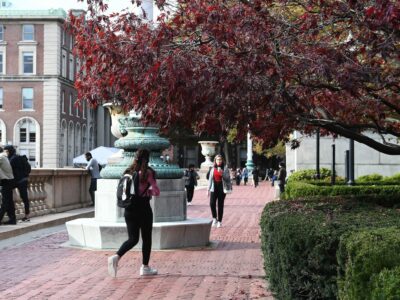
Chandler Precht is the associate director of sustainability programs at the Columbia Climate School and is an adjunct professor in the MS in Sustainability Management program. She is a Florida native, whose passion for sustainability can be traced back to her childhood in Miami.
Her work with the Earth Institute began in 2015, as an intern while studying environmental science at Barnard College. Following graduation in 2018, Precht pursued a career in environmental consulting. Yet, she still found herself drawn to higher education and completed her MS in Sustainability Science while working as a consultant.
As an alumna of the MS in Sustainability Science program and a longtime admirer of Florida’s natural environment, Precht brings a valuable perspective to her role in the classroom and position as associate director — with a keen understanding of the graduate student experience and a relentless passion for sustainability.
What initially motivated you to pursue the field of sustainability?
My earliest memories involve sand, salty air, the sound of waves crashing against the shore, and the distinct aroma of the original Coppertone sunscreen. Growing up in Miami with the beach and ocean as my playground shaped my appreciation for the natural world. It also doesn’t hurt that I grew up with a world-renowned marine scientist and coral reef expert, whom I fondly call “Dad.” This environment stimulated my creativity and inspired an innate curiosity to pursue a career in STEM and an inherent passion for sustainability.
I’ve framed these childhood moments in a lighthearted, positive light because I am a climate optimist — most days — and have faith that we will solve the climate crisis. However, my continued motivations and commitment to resiliency initiatives stem from the adversity that my family and I have experienced first-hand — from the devastation we faced after Hurricane Andrew, to school closures due to unprecedented flooding and unsafe road conditions, to an unexpected evacuation across the country in the wake of Hurricane Wilma … just to name a few.
Beyond these experiences, I’ve witnessed the progressive destruction of the natural environment that once sparked my love for science. I have an emotional connection to nature and when I realized how personal these issues are for me, I never looked back. I am devoted to leading a sustainable life — however imperfect — to leave a better planet for future generations, so that one day they may be able to appreciate even a fraction of the beauty that I once experienced.
What drew you to the sustainability graduate programs?
I was drawn to the programs because I wanted to be surrounded by like-minded individuals with the same passion and drive for preserving the natural world. It’s not enough to just be passionate, though. We need to thoroughly understand the global impacts of climate change and environmental hazards, and then use that data-driven information to communicate real-world applications in management and leadership roles. The beauty of the Sustainability Management (SUMA) and Sustainability Science programs is that students are being taught these various concepts through the curriculum and then later applying them to their professional pursuits.
What course are you currently teaching?
I am currently teaching a section in the Integrative Capstone Workshop, overseeing a team of 10 student consultants in the SUMA program and working with the Coral Restoration Foundation, our client. The deliverables will be to offer a tool to enhance environmental education and inspire constituents to protect coral reefs and empower climate change resilience.
What were you most excited about when you were presented with this opportunity?
First and foremost, I was excited by the prospect of being in a classroom with the best and brightest. Aside from collaborating with the next generation of sustainability practitioners and conservationists, this capstone project and client were enticing given my south Florida upbringing and comprehensive research background centering on marine ecosystems and the role that global climate change plays in their degradation and susceptibility to disease. I am particularly eager to enhance educational programming about coral reefs and nature, especially in underserved communities, that inspires youthful wonder and excitement — how I was first drawn to the field.
What changes do you hope to see in the field of sustainability in the future?
Equity needs to be at the center of every conversation around sustainability — full stop. There are integral connections between climate change and social justice that are essential to achieving sustainability.
What advice do you have for students?
Sustainability is more than your degree and more than whatever industry you find yourself in, so get uncomfortable — let people and ideas test you! You won’t grow or advance the field of sustainability if you aren’t being challenged and presented with new ideas. Likewise, be bold in presenting your climate science ideas because you have the tools that many before you did not — a superior education, a network, and a platform.



